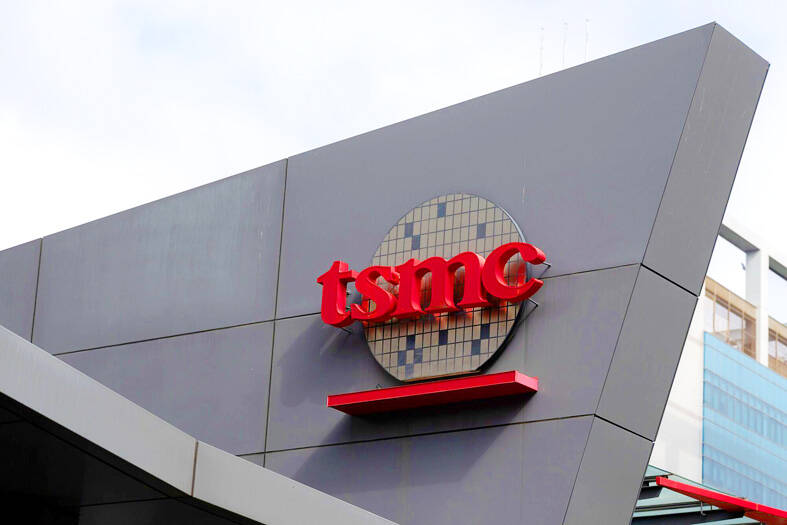Taiwan Semiconductor Manufacturing Co (TSMC, 台積電), the world’s largest contract chipmaker, plans to sign a memorandum for comprehensive collaboration with Japan’s Kyushu University covering training and joint research on semiconductors, the **Yomiuri Shimbun** reported yesterday.
TSMC is expected to hold seminars at the university and the two plan to conduct joint studies and write papers together, the newspaper cited sources close to the university as saying.
They are also considering an internship program, under which Kyushu University students would be dispatched to TSMC operations in Taiwan, it said.

Photo: Mike Kai Chen, Bloomberg
The agreement would be TSMC’s first of its kind with a Japanese university after the chipmaker launched its first semiconductor manufacturing fab in Kumamoto Prefecture in late February as it aims to improve chip supply resilience and help revive Japan’s semiconductor industry.
The Kumamoto fab is slated to start mass production in the fourth quarter of this year, and TSMC plans to build a second fab in the prefecture — with partners Sony Semiconductor Solutions Corp, Denso Corp and Toyota Motor Corp — which is scheduled to start operations by the end of 2027.
With TSMC’s arrival, Kyushu, where Kumamoto Prefecture is situated, is expected to see a shortfall of 1,000 technical experts in the semiconductor industry per year over the next decade, the **Yomiuri Shimbun** said.
To ensure sufficient talent for its operations, TSMC believes it is necessary to work with Kyushu University, it said.
Separately, Japan and the US are to announce closer cooperation in high-tech areas such as artificial intelligence (AI) in a joint statement when Japanese Prime Minister Fumio Kishida meets with US President Joe Biden this month, the **Asahi Shimbun** reported on Saturday.
Biden is set to host Kishida for an official visit to the US on Wednesday next week.
Calling ties between the allies a "global partnership," the joint statement is to advocate stronger cooperation in AI and semiconductors, **Asahi** said without citing its sources.
As part of the agreement, Japan and the US would likely set up a framework for AI research and development, working with Nvidia Corp, Arm Holdings PLC and Amazon.com Inc, among others, the newspaper said.
The US has moved aggressively in the past few months to halt shipments of advanced AI chips to China, in its efforts to stop Beijing from getting cutting-edge US technology that could strengthen its military.

Shares in Taiwan closed at a new high yesterday, the first trading day of the new year, as contract chipmaker Taiwan Semiconductor Manufacturing Co (TSMC, 台積電) continued to break records amid an artificial intelligence (AI) boom, dealers said. The TAIEX closed up 386.21 points, or 1.33 percent, at 29,349.81, with turnover totaling NT$648.844 billion (US$20.65 billion). “Judging from a stronger Taiwan dollar against the US dollar, I think foreign institutional investors returned from the holidays and brought funds into the local market,” Concord Securities Co (康和證券) analyst Kerry Huang (黃志祺) said. “Foreign investors just rebuilt their positions with TSMC as their top target,

REVENUE PERFORMANCE: Cloud and network products, and electronic components saw strong increases, while smart consumer electronics and computing products fell Hon Hai Precision Industry Co (鴻海精密) yesterday posted 26.51 percent quarterly growth in revenue for last quarter to NT$2.6 trillion (US$82.44 billion), the strongest on record for the period and above expectations, but the company forecast a slight revenue dip this quarter due to seasonal factors. On an annual basis, revenue last quarter grew 22.07 percent, the company said. Analysts on average estimated about NT$2.4 trillion increase. Hon Hai, which assembles servers for Nvidia Corp and iPhones for Apple Inc, is expanding its capacity in the US, adding artificial intelligence (AI) server production in Wisconsin and Texas, where it operates established campuses. This

H200 CHIPS: A source said that Nvidia has asked the Taiwanese company to begin production of additional chips and work is expected to start in the second quarter Nvidia Corp is scrambling to meet demand for its H200 artificial intelligence (AI) chips from Chinese technology companies and has approached contract manufacturer Taiwan Semiconductor Manufacturing Co (TSMC, 台積電) to ramp up production, sources said. Chinese technology companies have placed orders for more than 2 million H200 chips for this year, while Nvidia holds just 700,000 units in stock, two of the people said. The exact additional volume Nvidia intends to order from TSMC remains unclear, they said. A third source said that Nvidia has asked TSMC to begin production of the additional chips and work is expected to start in the second

US President Donald Trump on Friday blocked US photonics firm HieFo Corp’s US$3 million acquisition of assets in New Jersey-based aerospace and defense specialist Emcore Corp, citing national security and China-related concerns. In an order released by the White House, Trump said HieFo was “controlled by a citizen of the People’s Republic of China” and that its 2024 acquisition of Emcore’s businesses led the US president to believe that it might “take action that threatens to impair the national security of the United States.” The order did not name the person or detail Trump’s concerns. “The Transaction is hereby prohibited,”